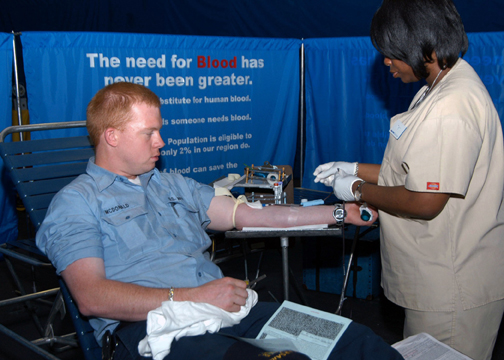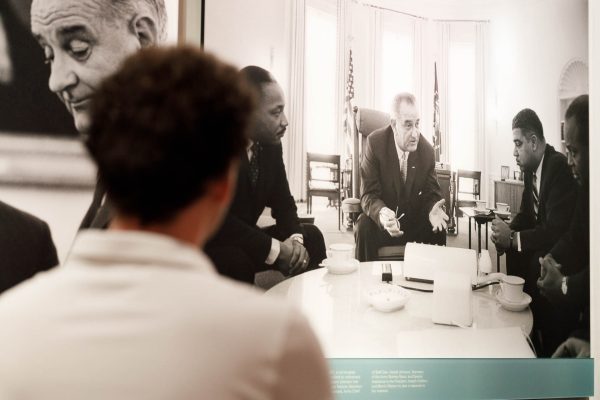Blood donation restrictions disenfranchise potential donors

In the hangar bay aboard the amphibious assault ship USS Kearsarge (LHD 3), a New York City blood center worker, Nitisha Moore takes blood from blood donor Electrician’s Mate 3rd Class Jason McDonald. The blood drive is one of several community-relations projects, which Kearsarge and her crew are participating in during Fleet Week 2006.
Someone is in need of blood every two seconds, according to the Department of Health and Human Services.
It only seems right to do one’s part to aid the 4.5 million Americans in need of a blood transfusion each year. However, the Blood Center of Central Texas makes it increasingly difficult for people to donate blood by placing so many restrictions on donors.
Perhaps the largest demographic disenfranchised by the center is gay men. On the questionnaire that must be filled out before donating, all men must answer some variation of the question, “From 1977 to present, have you had sexual contact with another male, even once?”
If he answers “yes,” the potential donor is unable to give blood.
The reason is clear — gay men have the highest likelihood of testing positive for the HIV virus. Blood banks want to not only protect their patients’ health, but also themselves from litigation should a patient contract the HIV virus after blood donation.
However, they test all patient’s blood, regardless of orientation, for the HIV virus. Thus, it makes no sense to defer thousands of eligible gay, HIV-negative donors due to antiquated and homophobic ideas.
The practice of deferring gay men is even more questionable since they make up only 56 percent of all HIV cases in 2009, according to the Center for Disease Control. There is no immediate deferral question for the remaining 44 percent of the HIV-positive population.
The restrictions do not end there, however.
If you have traveled to a malaria-ridden country, you are blacklisted from blood donation for a full year.
Most Americans travelling abroad take malaria medication and greatly reduce their risk of contracting malaria. In fact, there are only about 1,200 malaria cases reported in the U.S. any given year.
Secondly, if a person has malaria, symptoms would appear within seven to 40 days of infection. The one year wait time is arbitrary and disenfranchises thousands of potential donors.
Also, the center defers donors for a year after getting a tattoo from out of state or an unlicensed Texas facility.
This is merely state elitism. It is conceited of the state to believe a tattoo not done in Texas is inferior or diseased.
It should not matter what state the tattoo was received in if it will still be tested for any potential diseases.
The Blood Center of Central Texas and dozens of other blood donation centers have good intentions. However, with the world becoming increasingly global, gay-friendly and celebratory of body art, they are falling behind the times.











